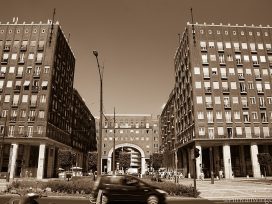
The centuries-old debate over whether certain countries belong to the East or the centre of Europe has fairly little to do with geography. In this Gagarin podcast episode, anthropologist Iván Kalmár discusses privilege, race and cultural hegemony.
Did the left realise the real significance of the fall of the Berlin Wall, or was it even willing to do so? In a decade of change, what has Europe achieved, or maybe more importantly, which achievements and challenges of the past decade have been recognised at all?
Two things attracted attention in the international conference organised in Madrid in 1991 on the fall of the Berlin Wall: its lack of repercussions and the reticent relationship of the guests from the East with their respective countries. The event could not have been more news worthy nor the participants more illustrious. However, there was hardly any press coverage beyond the bare facts and nobody tried to interview the foreigners present who included intellectuals known in Spain such as Ágnes Heller, for example. Even less interest was awoken among the Madrid public by the possibility of receiving first hand and expert information and explanations about the most significant event in Europe since the Second World War and, its immediate consequence, the antagonistic division of the continent. Day after day, in the great hall of the Círculo de Bellas Artes, wandered the same handful of people: the speakers and some of their compatriots established in Madrid. Apparently, both the students of philosophy, journalism, sociology or that new and promising discipline called political science and their teachers (or anyone from the generation who with their acts and will contributed to the transition) had something better to do during those days.
In this trivial anecdote it is possible to grasp a phenomenon of greater magnitude: the left did not wish to discover the real significance of the disappearance of the Wall and, in keeping with their objective, so far they have not managed to either understand it or relate it to their own concerns. They go from uncertainty to uncertainty and from contradiction to contradiction: their ideology embraces the demand for international intervention in the Bosnia conflict (as there is no oil there, they observe correctly, the Americans are not interested) and the denial of the same intervention in the ethnic cleansing of Kosovo; they celebrate the judgement against the right-wing dictator Pinochet, and become indignant before the mere possibility of applying the same process to a dictator from the opposite side; they distrust nationalisms and populist demagogy, but show a certain understanding and sometimes even sympathy towards a Venezuelan military officer who, failing in his attempt at a coup, successfully tried the democratic route in order to carry out his redeeming mission.
The stance of this dialectic left is divided between a centre-right party with vaguely social democratic ideology and some delirious Marxist option. The first variation, without knowing or recognising it naturally, resigns itself to the thesis of Fukuyama about the supposed end of history and the victory of a type of somewhat deficient but immovable social limbo. The other, immutably installed in the Marxist idea that the true history of Humanity has yet to begin, has never proposed another model of society other than that which failed thunderously with the fall of the Soviet Empire.
As far as the ambiguous relationship of the Eastern intellectuals with their country is concerned, the case was the following: two years after the fall of the Soviet Empire, all the intellectuals present in the congress continued living in the West. This unusual fact in the long history of political exiles brought me to the conclusion that the reason for the rather unpatriotic reticence is the same that discourages the intelligentsia of the West with respect to the post-Communist process: the lack of a Cause.
Demolishing the Berlin Wall may be a cause for some, just as constructing it was for others. But that Wall was already demolished, and moreover, not because of any merit on the part of the exiles or even because of those who had been behind it. If it fell, it fell because of high politics and the enigmatic unwillingness of the Soviet Union. The melancholy of the revolutions of 89 had something to do with this fact: that they were not revolutions, not really their own achievements, although the whole world happily attended the burial. But what came afterwards decidedly lacked a cause in the sense to which the great causes of modernity had accustomed us. Nobody is prepared to die to set up the market economy; the creation of a middle class means no masses to harangue, industrial rationalisation is not an ideal to devote oneself to and, with the exception of the government spokesmen, nobody agitates and raises propaganda in favour of economic shock treatment. Finally, the great post-Communist challenges do not salve a bad conscience, do not make one feel more noble and do not encourage resistance. The most visible consequences of this transition are ugly and easy to unmask. It is here where the old left guard of the West finds a common platform with the new populist and nationalist demagogy of the East: to attack that savage capitalism, that voracious mercantilism without ideals.
Much has been said of the horrors of the last ten years; of the achievements, almost nothing. For example, that, in spite of everything, in not one of the countries of the old dictatorships of the proletariat is there a manifest dictatorship but, in contrast, in some democracy has been consolidated; that in all these countries, even in Russia, a middle class is being born; that racism and the excluding nationalisms, though present everywhere, only have free reign in the Balkans. What is repulsive in the transition to capitalism is what could be expected of such a situation and legacy. What was not so predictable is these barely noticeable achievements brought about thanks to the tenacity and bravery of the democrats of the East who, in very adverse conditions and without the compensation of the Redeeming Ideas, have spent ten years working for a more equal and just society.
One of the new devils for the Western liberals is single thought. It is attacked with such unanimity that their heroic denouncement currently constitutes single thought. At least, in terms of the media. The truth is that to stray from this line does not look good and automatically aligns you with the powerful. It is better, therefore, to resist in the post-modern trench of the best paid columns against the system. Public opinion will still take time to realise that the real challenges of our era are found precisely in this prosaic, monotonous and almost impossible labour of constructing societies out of the debris.
Published 25 October 2000
Original in English
First published by Lateral (Spanish version); Eurozine (English version)
Contributed by Lateral © Mihály Dés / Eurozine
PDF/PRINTSubscribe to know what’s worth thinking about.

The centuries-old debate over whether certain countries belong to the East or the centre of Europe has fairly little to do with geography. In this Gagarin podcast episode, anthropologist Iván Kalmár discusses privilege, race and cultural hegemony.

Born into a cosmopolitan Jewish family, Ferenc Fejtő lived a turbulent youth as a Marxist and social democrat in Horthy’s Hungary. Having fled just before the fascist rise to power, he led a more comfortable life as a journalist and historian of eastern Europe in Paris, remaining within the left even after his disillusionment with communism.